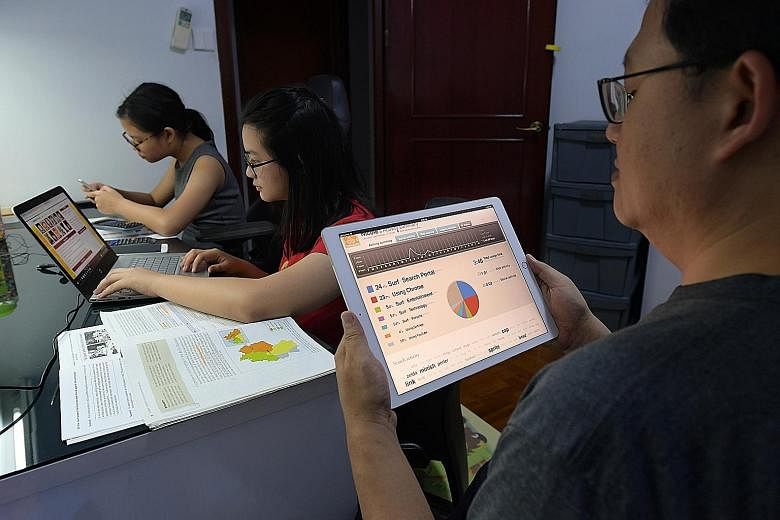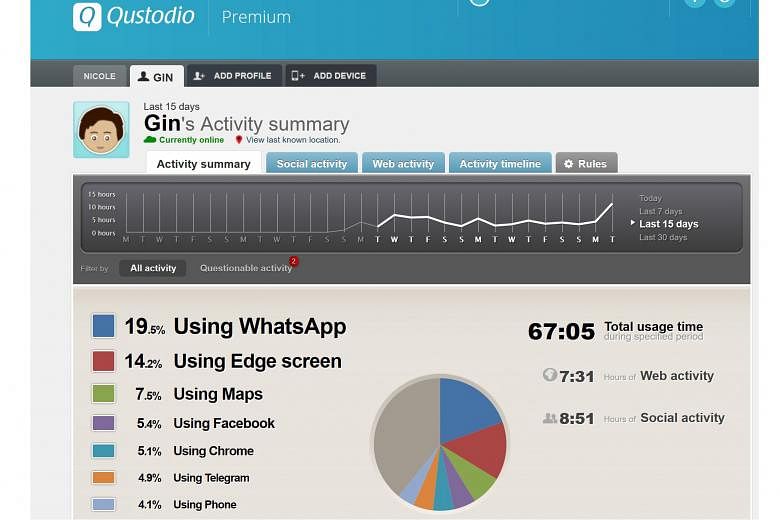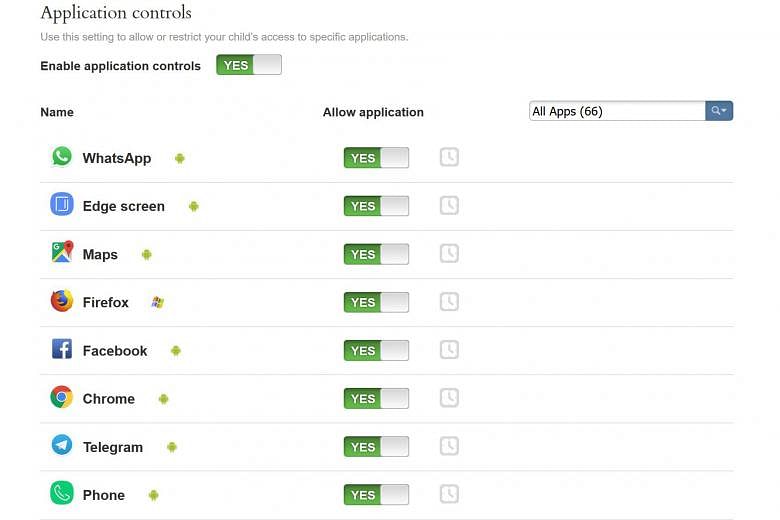Parenting in the digital age is tough. As a father of three daughters aged seven to 16, I worry about my kids stumbling upon smut or other unsuitable content. Another fear - of them spending too much time playing games instead of figuring out the answers to that challenging maths question.
As they grew older and got their smartphones, which made PC-only parental control obsolete, I believed common sense and building trust with my two older daughters were the best forms of protection.
If you do not want to take chances, there are options such as Qustodio, a parental control software. It offers protection on both PCs and smartphones - Windows and Mac, Android and iOS - so you can monitor the same child's online activities across multiple devices.
It is truly a Swiss-Army knife - offering Web filtering, app control, time scheduling, calls and SMS monitoring plus GPS location tracking in a single package. I took the software for a two-week spin, installing one licence on my elder daughter's Android phone and two more on my own smartphone and home computer.
SETTING UP AND INSTALLATION
Qustodio is available as annual licences via www.qustodio.com at US$54.95 (S$72.40) for five devices or US$96.95 for 10. But Singtel is now offering a monthly subscription for $5.90 and $9.90 a month respectively at www.singtel.com/ surfschool. You also get the first three months free and can terminate at any time with no penalty. This deal is only for Singtel customers.
Once signed up, you need to create a master account and password. Install the Qustodio app on each device and then key in your account details to link your master account to each device. The software runs in the background of each device and sends an e-mail alert if the app is removed or tampered with.
-
Report Card
-
GOOD
• Software runs in the background of devices without lag
•Able to connect multiple devices and users to a single browser-based parent dashboard
• Easy to install and convenient to use
• Granular control over time and usage
• Works on phones and PC - Android, iOS, Windows PC and Mac - and on all networks
• Smut-filtering software works well, even in private browsing mode, though it is not foolproof
•Google Safe Search turned on by default to hide inappropriate search results on Google and You Tube
•Phone calls and SMS monitoring on Android devices to detect scammers and undesirable strangers
•Location tracking and panic mode (the latter only for Android devices)
-
COULD BE BETTER
•Some missing features for iOS devices
•Unable to track chat messages on WhatsApp, WeChat and other messaging apps
• Unable to track social media usage except for some limited activities on Facebook
• Password protection makes it tough to uninstall, but app can be disabled with some tinkering •Qustodio is the Swiss-Army knife of parental control software, offering Web filtering, apps and games control, usage time restrictions, calls and SMS monitoring plus location tracking for multiple devices in a single package.
You can choose to hide the app, but I would advise against it as it can be easily discovered.
I believe it is better to build a relationship of trust and to educate kids on cultivating healthy online habits rather than surreptitiously spying on them.
It is difficult for the child to uninstall the Qustodio app, but I have found workarounds to disable the app.
A BIRD'S EYE VIEW THROUGH AN EASY-TO-USE DASHBOARD
You can easily monitor and manage your children's use of their devices from the Qustodio Family Portal dashboard.
From tracking my own usage over the last 15 days, I can see that I have spent a total of 67 hours or an average of four hours a day on my smartphone and my home PC. Most of my time is spent on WhatsApp (19 per cent) which has become the default group communications tool that I use for work and my personal life.
The Search activity summary shows the keywords I have been searching most frequently over the period. In my case the words Monster, Hunter and World came up tops because I was looking for tips to beat the new Monster Hunter: World console game. The word Kebaya also features prominently because my second daughter was using my PC to research Peranakan culture.
You can also see the time spent on each phone and computer app, the most surfed sites followed by the contacts that the user has spent the most time talking to over the specified period.
You can even manage access by blocking the app, site or phone contact from here, instead of via the settings button.
What I really like is that I can see who I have been talking to the most. If your child is spending 20 hours a week speaking to a stranger or calls are coming from unknown overseas numbers, that could be a warning sign that something is not right. If you have a young child, you may want to limit the phone numbers that can be used to contact your child, in which case you can simply whitelist the incoming call numbers and block everyone else.
FILTERING INAPPROPRIATE CONTENT
By default, the Web filtering system automatically blocks access to 10 types of sites, including those with pornography, mature content, violence, gambling, profanity, drugs and alcohol.
From my experience, these filtering systems are not foolproof, but I found Qustodio was able to effectively block many of the well-known smut sites. You have the option to enable or disable each category and even allow or block individual sites.
Web filtering software works by comparing the site the user is trying to access against its database of blocked and legitimate sites. To be safe, parents can also turn on a feature that prohibits all access to sites that are not recognised by Qustodio. But there is a downside to this, as you will potentially block access to legitimate sites too.
Qustodio turns on Google Safe Search, a built-in feature in Google and YouTube, which automatically blocks undesirable content from appearing on the user's search results. The filtering system can be rather strict, as it stopped me from watching the trailers of the popular upcoming game God Of War.
Once, I accidentally typed in www.fgmail.com instead of www.gmail.com into my browser. The former tricks users to popular sites linking them to a porn site. At first, I managed to access the smut site, but it seems that Qustodio has self-learning capabilities and later blocked my access when I typed the link again.
TIME CONTROL
The risk of children spending all their time playing games and chatting with friends instead of doing their schoolwork is very real. I know this because I almost failed my first-year undergraduate exams as I tried to conquer virtual Japan in a PC game called Nobunaga's Ambition, instead of figuring out the principles of criminal law.
Qustodio lets you set time limits on usage. You can either lock online access, but permit offline access, lock the device completely or set an alert when the time limits are reached.
You can limit usage on each individual device based on a customised weekly schedule. For instance, you can limit online access on the child's phone on weekdays to only during school commute hours (for example, noon to 2pm) as well as the time between dinner and bedtime (7 to 10pm) while allowing free access on weekends.
You can set a totally different policy on the child's PC. Another way is to simply limit the number of computer hours a day to two on weekdays, and once that time is up, the child will not be able to access the computer at all.APP CONTROL You can even control individual apps. This works on any phone app or PC software, so you can limit Snapchat, Instagram, as well as the hottest PC games in the market. However, this feature is limited in iPhones and iPads as only 68 apps can be managed this way. It worked perfectly on both my Android phone and Windows PC. You can even limit the talk time of your child, though these days they text more than they talk.
CALLS AND SMS MONITORING
Qustodio lets you track every incoming and outgoing phone call and SMS on Android devices. You can see how long each call took, what time it was made, as well as the contact name and phone number. For SMS, you can even view the text messages sent. This is a very useful feature to prevent scammers and ill-intentioned strangers from reaching your kids. It also alerts parents to a child being cyber-bullied or spending too much time on the phone with friends.
What is missing, though, is the ability to monitor chat apps such as WhatsApp and Telegram at a similar level of detail. Qustodio has some limited Facebook monitoring but, beyond that, it is not able to monitor what is happening inside a child's social media accounts such as Instagram and SnapChat.
LOCATION TRACKING AND PANIC BUTTON
A very nice feature of Qustodio is the ability to track your child's phone. This is great for parents who want to check if their kids are safely in school without having to call them, as schools prohibit phone usage during school hours. The phone's last location is sent via GPS and parents can view it through the Web dashboard. Parents will also get the location update on the mobile app, so they can check anytime. For Android devices, parents can even set the time interval for the location updates.
Another feature that I really like is the Panic or SOS button, an app button which the child can press if he feels threatened. Once activated, the system tracks and sends the location of the child in five-minute intervals to a list of up to five pre-configured contacts, who will then receive e-mail and SMS alerts notifying them that the child is in distress, together with the phone's last known location until the child ends the alert. The child can also press the connected earphones button three times to activate the SOS button. Unfortunately, this feature works only on Android phones.
Having used Qustodio for more than three weeks, I find that it has multiple features which many parents of schoolgoing children will find useful. I still believe in trust and education, but for parents who want peace of mind, Qustodio does deliver the goods.



